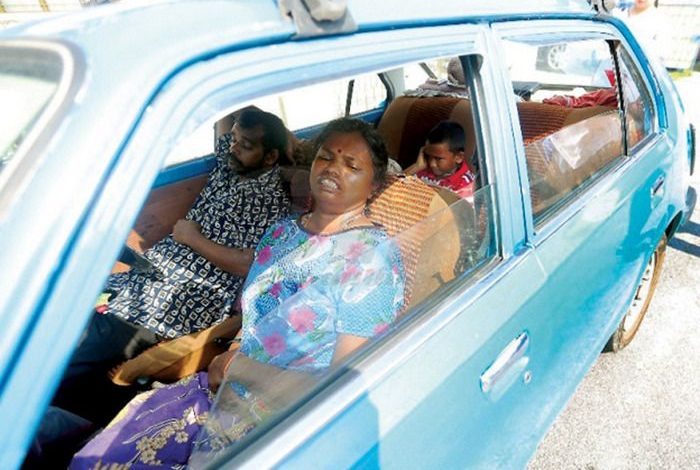A Family’s Nightmare in a House on Wheels


There are different types of homes, around the world. You’ve heard about living on the water, in a houseboat, or barge; or living in a tree house, nestled among the branches; or in a cave dwelling, like in Turkey, or perhaps, deep underground like some modern dwellings.
So when someone talks about a house on wheels, we imagine that he is talking about a caravan or a mobile home. Not so, for R. Rengaiya, a 51-year-old flower seller, who has been forced to call his blue 1973 Honda Civic hatchback, home.
Rengaiya has lived in his “house-on-wheels” with his 44 year-old wife, N. Karnagi and 7-year-old son, for the past two and half months. He drives from parking lot to parking lot, in Kampar, Lawan Kuda, Gopeng and Jelapang. He and his family ‘moved’ into their new home when he could not pay the rent for his house in Taman Kinta in Gopeng, in early March.
He said that when he complained about a termite infestation in his rented house, which incidentally did not have a toilet, the owners told him that he had to move out, so they could build a new home.
With house rentals being prohibitive, Rengaiya’s friends, who were moved by their plight, invited him and his family, to move in with them, but he did not want to trouble them and, declined their offers.
The loss of a roof over his head, put an additional strain on Rengaiya’s employment prospects, as he could not continue with his own business. He is self employed and sells flowers by the roadside.
If that was not bad enough, the constant moving around has meant that for the past one-and-a half months, his son has been absent from school. Rengaiya claims that the family have stayed in about 30 different locations, since he was turfed out of his house.
His wife, Karnagi cannot walk, because she was accidentally scalded when she was eighteen. She is virtually paralysed from the waist down and uses a wheelchair.
Rengaiya was diagnosed with heart and kidney conditions, but a few years ago, generous donations from the public, enabled him to have a kidney transplant operation in India. He said, “My heart doctor says I could go any time. I only want my family to have a home, if I do pass away.”
The family survives on a RM350 handout from the welfare department, but this barely covers food, essentials, and medicine.
If one has no kitchen, one has to rely on “tapau” food, which is expensive. Rengaiya’s lifestyle means that the family stop at temples for their baths, and beg for money, for fuel for their car.
On 20 April 2016, Rengaiya attended a press conference, arranged by the Perak Barisan Nasional Public Service and Complaints Centre. The chief, Mohd Rawi Abdullah, is looking into Rengaiya’s plight and is attempting to get him a family unit in the Ashby Road, Ipoh City Council’s (MBI) low-cost housing flats.
There are many questions which are left unanswered.
Malaysians who suffer in similar circumstances should be made aware of their rights, but who is to tell them? Rengaiya should have approached the welfare department to find out if he is eligible for aid.
In the meantime, the welfare department may have access to temporary accommodation for people like Rengaiya. If they have not, then perhaps, this bit of their policy needs looking into.
Our dream of Wawasan 2020, in which we will have a developed nation, is only four years from its scheduled date. If we have homeless people and hard-core poor families sleeping in cars, Wawasan 2020 is not a dream, but a delusion.
It is bad enough to have a home without proper running water, electricity or sanitation, but for their young son to be deprived of an education is breaking the law. The rights of the child is being neglected.
Rengaiya’s son should be placed in foster care, and be reunited with his family, when their circumstances improve.
RM350 is not enough, for a family, in which one member is disabled, and a breadwinner who cannot provide. There should be a total revamp of the welfare services. One person could not survive on RM350 per month, let alone for a family of three.
Something is wrong, somewhere, if people like Rengaiya still exist in Ipoh. Who will speak up for people like him?


